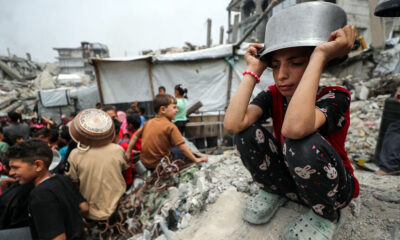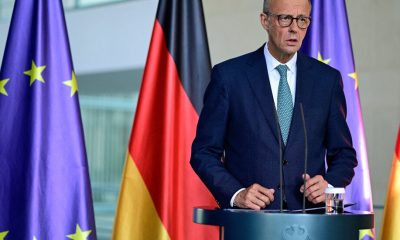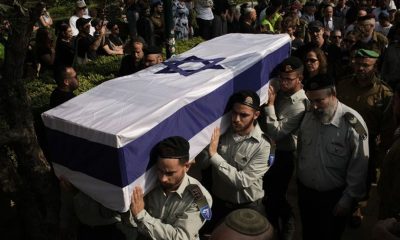International
Israel fires two officers after finding grave errors in strike on aid workers
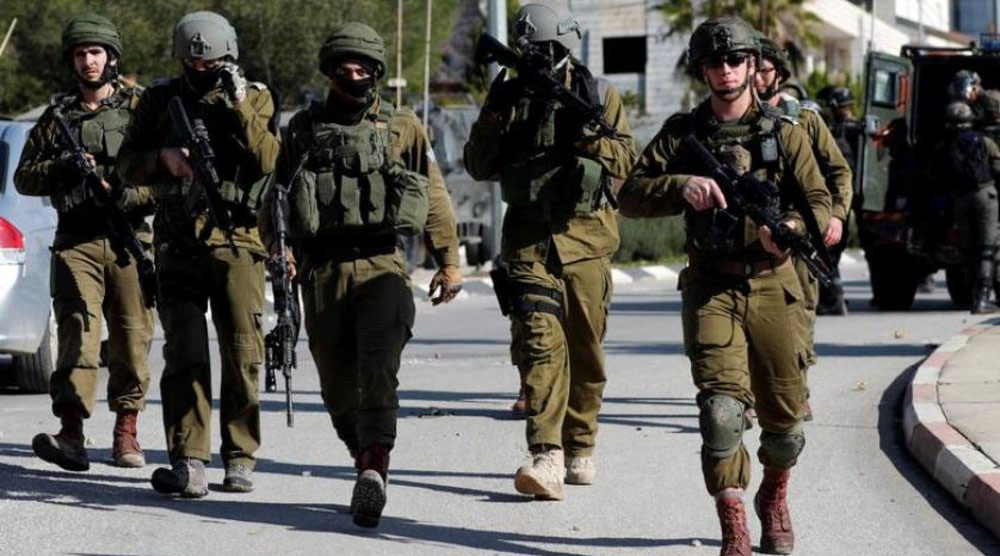
Israel fires two officers after finding grave errors in strike on aid workers
The Israeli military dismissed two officers and formally reprimanded senior commanders after an inquiry into the killing of seven aid workers in an air strike in Gaza this week found serious errors and breaches of procedure, the military said.
The inquiry found Israeli forces mistakenly believed they were attacking Hamas gunmen when drone strikes hit the three vehicles of the World Central Kitchen aid group late on Monday night, and that standard procedures had not been followed.
“The strike on the aid vehicles is a grave mistake stemming from a serious failure due to a mistaken identification, errors in decision-making, and an attack contrary to the Standard Operating Procedures,” the military said in a statement issued on Friday.
The killing of the seven aid workers, who included citizens of Britain, Australia and Poland, a dual U.S. Canadian national and a Palestinian colleague, triggered global outrage this week.
In a call with Israeli Prime Minister Benjamin Netanyahu on Thursday, U.S. President Joe Biden threatened a shift in U.S. policy towards Israel unless it reduced harm to civilians in Gaza, which already depended on aid before the war and has seen hunger spread since fighting began six months ago.
Following the publication of the findings, World Central Kitchen demanded an independent commission to investigate the incident. “Without systemic change, there will be more military failures, more apologies and more grieving families,” according to a statement published by WCK.
READ ALSO:
- Court convicts Bobrisky for naira abuse
- Worshippers narrowly escape as truck crashes into Niger mosque
- Six Russian warplanes destroyed, 20 feared killed in Ukraine drone strike
The army had already acknowledged that the seven WCK employees had been killed in an airstrike but the unusually swift investigation underlined the impact the incident has had on world public opinion.
Jose Andres, the chef who founded World Central Kitchen, said this week the seven workers had been targeted “systematically, car by car” as they moved to seek shelter when their vehicles were hit in succession.
The military said it had dismissed a brigade chief of staff with the rank of colonel and a brigade fire support officer with the rank of major, and formally reprimanded senior officers including the general at the head of the Southern Command.
The case was also handed over to the military advocate general to consider a possible criminal investigation, the military said.
BAG MISTAKEN FOR A RIFLE
The convoy hit was the second of four planned missions to deliver some 200 tons of food brought to Gaza by sea last month under the management of WCK as part of efforts to increase the amount of aid getting into the enclave.
The military said that as the aid convoy the light vehicles were accompanying was travelling down the coastal road in Gaza towards a logistics point late on Monday, armed suspects had climbed on to at least one of the trucks.
The army showed reporters drone footage of a man on top of a lorry firing a rifle, which a spokesperson said had prompted the military to try, unsuccessfully, to contact WCK coordinators.
After the convoy reached a hangar and the trucks were unloaded, the three WCK vehicles had left the location and turned south down the coast road shortly after 11 p.m. (2100 GMT). However, commanders could not see their identifying logos in the dark and did not identify them as belonging to WCK.
Yoav Har-Even, the former major general who led the inquiry, said forces had acted on the mistaken belief that the vehicles had been seized by Hamas fighters.
As the cars left the hangar, one of the men getting into the vehicles had been carrying a bag which the operators watching drone footage took to be a rifle.
“The state of mind at that time was that the humanitarian mission had ended and that they were tracking Hamas vehicles with one suspected gunman, at least one suspected gunman, that they misidentified to be inside one of the three cars,” he told reporters in a briefing.
“They struck that car and then they identified people running out of the car and entering a second car, which is when they decided to strike the second car. Then two people left the second car and entered the third car, which is when they struck the third car.”
Those strikes were in breach of IDF standard operating procedures, he said.
The army pledged to address the fact that it had been unable to see the rooftop logos in the dark as part of a wider package of lessons to draw from the disaster.
Israel fires two officers after finding grave errors in strike on aid workers
Reuters
International
€10 Million Stolen from Sparkasse Bank Vault in Gelsenkirchen Over Christmas
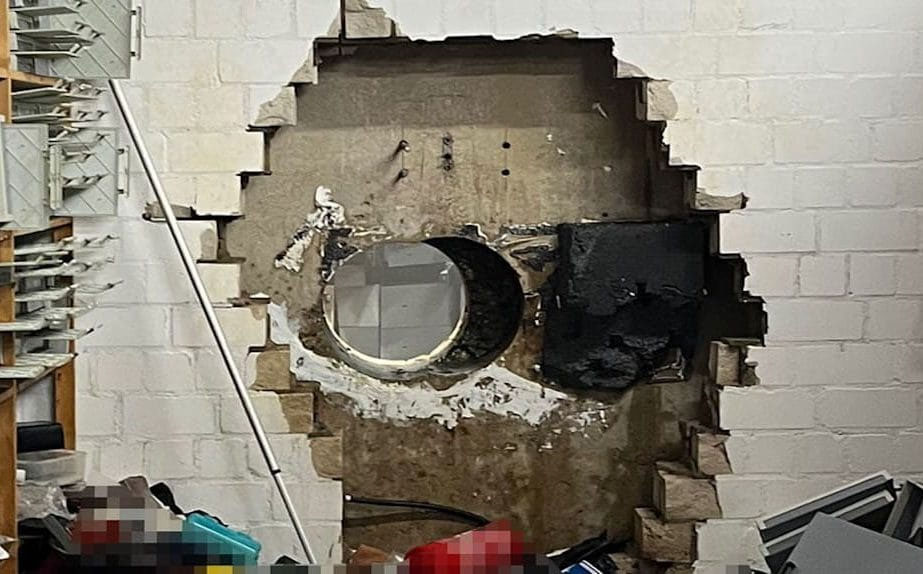
€10 Million Stolen from Sparkasse Bank Vault in Gelsenkirchen Over Christmas
Thieves exploited the quiet Christmas holiday to break into a branch of Sparkasse Bank in Gelsenkirchen, Germany, stealing at least €10 million, police confirmed on Tuesday.
The suspects drilled through a thick concrete wall to gain access to the bank vault, where they forced open customer safe deposit boxes and made off with the money and valuables.
The crime went undetected until the early hours of Monday, December 29, when a fire alarm alerted authorities to the breach. Most shops and banks in Germany are closed from the evening of December 24 during the holiday season, allowing the robbers to carry out the heist unnoticed.
READ ALSO:
- Assertion, Retraction, and Responsibility: Lessons from the Kailani–Dangote Episode
- NANS Declares National Protest Against Implementation of Tax Reform Law
- Labour Party Reacts to Peter Obi’s Defection to ADC, Calls 2023 Candidacy ‘Mistake’
According to witnesses, several men carrying large bags were seen moving through the stairwell of a nearby parking garage late on Saturday night. Investigators are also examining reports that a black Audi RS6, with masked occupants, left the garage early Monday morning. The car reportedly had stolen licence plates from Hanover, more than 200 kilometres from Gelsenkirchen.
Angry and anxious customers gathered outside the bank on Tuesday, demanding information about their belongings. One customer, who had used the deposit box for 25 years to store retirement savings, told Welt, “I couldn’t sleep last night. We’re getting no information.” Another reported storing cash and family jewellery in the box.
Police investigations into the massive bank robbery are ongoing.
€10 Million Stolen from Sparkasse Bank Vault in Gelsenkirchen Over Christmas
International
Elon Musk Faces Backlash Over ‘Hotness’ Remark on Teen Facing Deportation

Elon Musk Faces Backlash Over ‘Hotness’ Remark on Teen Facing Deportation
Tech billionaire and Tesla CEO Elon Musk has come under renewed criticism following remarks he made about the physical appearance of a teenage girl who was facing possible deportation from Denmark.
The backlash followed a post by Musk, 54, on X (formerly Twitter), where he suggested that people who are physically attractive should be exempted from deportation. The comment was made in reference to Audrey Morris, a 19-year-old American student whose immigration status in Denmark recently became a public issue.
Reacting to the comment, Morris described Musk’s remark as demeaning, saying it reduced her case to her looks rather than her personal achievements and life circumstances.
“It’s definitely crazy,” Morris told the Daily Beast, adding that while she was not entirely shocked, she was floored that such a comment came from someone of Musk’s stature.
She said public attention quickly shifted from her academic achievements, volunteer work, and long-term residence in Denmark to her appearance.
READ ALSO:
- IPOB Lawyer Ifeanyi Ejiofor Raises Alarm Over Death Threats to Self, Family
- Peter Obi Directs Labour Party Members to Register with ADC Ahead of 2027
- Driver in Anthony Joshua Crash Faces Possible Reckless Driving Charges
“It would’ve been really cool if he commented on my academic achievements or what I’ve accomplished,” she said. “That would have been helpful.”
Morris noted that although the attention was embarrassing, she hoped it would at least bring awareness to her situation.
The teenager has lived in Denmark since the age of nine after her family relocated from the United States in 2015 for her mother’s doctoral studies. She remained in the country under a temporary residency permit as an accompanying child, which expired in June 2024.
Her immigration troubles reportedly began after she moved into a boarding facility at her high school in another city and changed her address—an action that violated the conditions of her residency permit. At one point, the threat of deportation became serious enough for her to prepare to return to the United States, leaving behind her family and boyfriend.
In a later development, Danish authorities granted Morris a 10-year residency permit, sparing her immediate deportation. However, she was denied citizenship, even as her American mother and 15-year-old brother were granted the status.
“Denmark is my home—one hundred percent,” Morris said in an earlier interview. “I am as Danish as a foreigner can possibly be.”
Musk’s comment, in which he wrote that “8 or above level hotness should get an exemption,” has since drawn criticism from social media users and commentators who accused him of objectifying women and trivialising a serious immigration issue.
Elon Musk Faces Backlash Over ‘Hotness’ Remark on Teen Facing Deportation
International
Israel to Revoke Licences of 37 Aid Groups in Gaza, West Bank, Sparks International Outcry
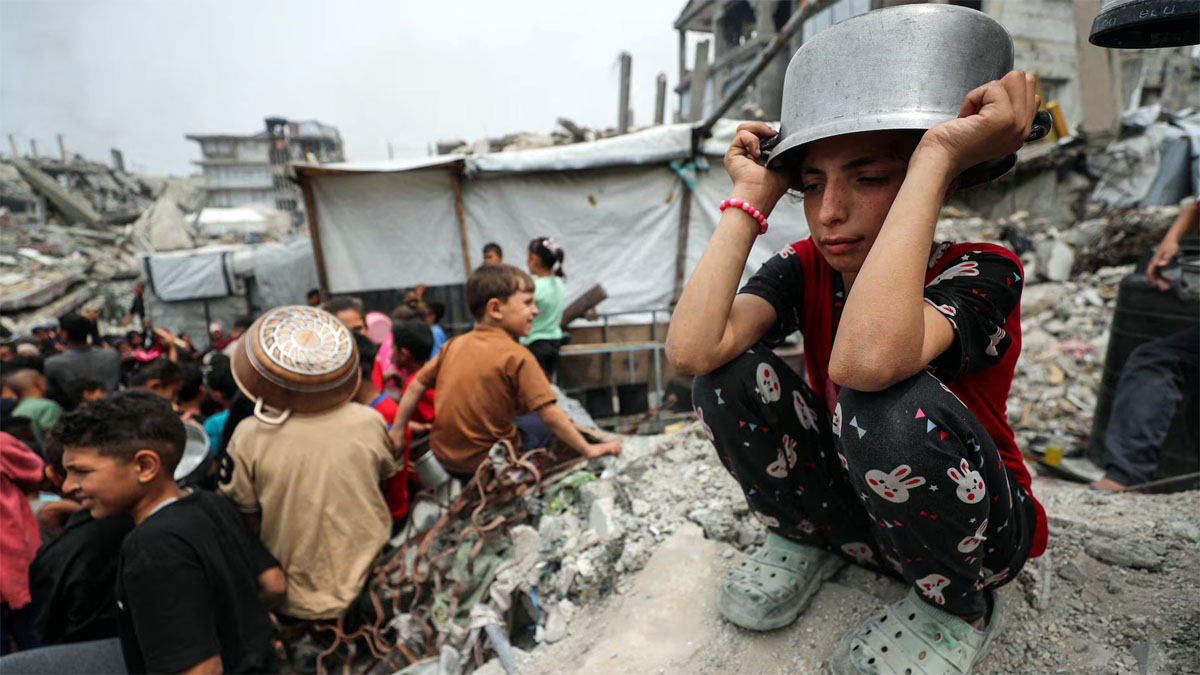
Israel to Revoke Licences of 37 Aid Groups in Gaza, West Bank, Sparks International Outcry
Israel has announced plans to revoke the licences of 37 humanitarian aid organisations operating in Gaza and the occupied West Bank, a move that has drawn sharp criticism from several Western governments and international humanitarian bodies.
The affected organisations include major international non-governmental organisations (INGOs) such as ActionAid, the International Rescue Committee, and the Norwegian Refugee Council, whose licences are set to be suspended from January 1, with their operations expected to wind down within 60 days.
According to Israel’s Ministry of Diaspora Affairs, which oversees the registration of aid groups, the decision followed the organisations’ failure to comply with new registration requirements, including the submission of what it described as “complete and verifiable personal details” of staff members.
The announcement triggered condemnation from the foreign ministers of 10 countries, including the United Kingdom, France, Canada, Japan, Norway and Sweden, who described the new rules as “restrictive” and “unacceptable.” In a joint statement, they warned that shutting down INGO operations would have a severe impact on access to essential services, particularly healthcare, in Gaza.
READ ALSO:
- UNN Students Reject 100% Fee Hike, Insist on Maximum 25% Increase
- Police Arrest 22-Year-Old Over Alleged Rape of Minor in Oyo State
- Army Rescues Over 1,000 Kidnap Victims, Destroys Bandit Camps Across North-West
The ministers stressed that the humanitarian situation in Gaza remains catastrophic and urged the Israeli government to ensure aid organisations can operate in a sustained and predictable manner.
Israel, however, insisted that the move would not disrupt the flow of humanitarian assistance. The Ministry of Diaspora Affairs said aid continues to reach Gaza through approved and vetted channels, including United Nations agencies, bilateral partners and selected humanitarian organisations.
The ministry argued that the licence revocations were necessary to prevent the infiltration of terrorist operatives into humanitarian structures, adding that fewer than 15% of aid organisations were found to be in violation of the new regulatory framework.
Israel’s military coordination body, Cogat, also claimed that the suspended organisations did not deliver aid to Gaza during the current ceasefire, and that their combined contribution previously accounted for about 1% of total aid volumes.
The new framework allows for licence denial on grounds including denying Israel’s existence, denying the Holocaust or the October 7, 2023 Hamas attacks, supporting armed struggle against Israel, promoting delegitimisation campaigns, or calling for a boycott of Israel.
In contrast, the Humanitarian Country Team of the Occupied Palestinian Territory, which represents UN agencies and over 200 local and international organisations, warned that the registration system “fundamentally jeopardises” humanitarian operations in Gaza and the West Bank. The group said the criteria were vague, arbitrary and politicised, making compliance difficult without breaching international humanitarian principles.
The forum noted that INGOs currently support most of Gaza’s field hospitals, primary healthcare centres, emergency shelters, water and sanitation services, and nutrition centres for malnourished children.
Israel’s Minister of Diaspora Affairs and Combating Antisemitism, Amichai Chikli, defended the policy, stating: “Humanitarian assistance is welcome — the exploitation of humanitarian frameworks for terrorism is not.”
Other organisations facing suspension include CARE, Medico International, and Medical Aid for Palestinians.
Israel to Revoke Licences of 37 Aid Groups in Gaza, West Bank, Sparks International Outcry
BBC
-

 metro2 days ago
metro2 days agoNiger Delta Crackdown: Army Seizes ₦150m Stolen Oil, Arrests 19 Suspects
-

 Sports3 days ago
Sports3 days agoCristiano Ronaldo Wins Best Middle East Player at 2025 Globe Soccer Awards in Dubai
-

 Sports2 days ago
Sports2 days agoAnthony Joshua injured as two die in fatal Lagos-Ibadan Expressway crash (plus photos)
-

 metro1 day ago
metro1 day agoMrs. Regina Akume Urges SGF George Akume to Return to Christianity Amid New Marriage
-

 metro1 day ago
metro1 day agoTwo Close Aides of Anthony Joshua Identified as Victims of Fatal Crash
-

 metro1 day ago
metro1 day agoOgun Man Arrested After ₦4,000 Debt Dispute Claims Stepbrother’s Life
-

 metro1 day ago
metro1 day agoMalami, Son, Wife Remanded Over ₦Billions Money Laundering Charges
-

 metro1 day ago
metro1 day agoTinubu Condoles Anthony Joshua After Ogun Crash That Killed Two Associates



